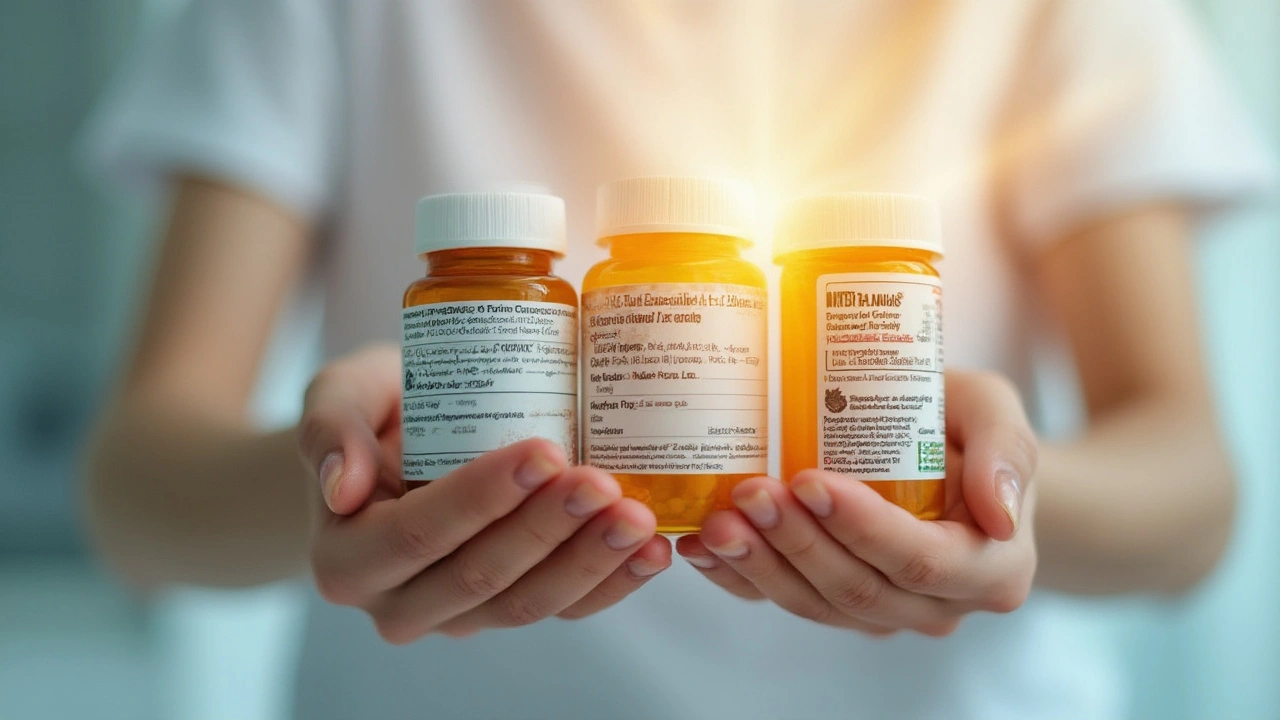The next time your rings feel tight or your ankles look like they belong to a sumo wrestler, you might start eyeing those "water pills" at the store. It's tempting, right? Pop a pill, pee out the problem, move on with your life. But hold up. When it comes to dropping extra water weight or targeting swelling, prescription diuretics like Lasix (furosemide) are in a league of their own. So, what about those over-the-counter diuretics—are they just clever marketing, or could they actually work? More importantly, are they safe? Let’s break down the science, sort the facts from the hype, and see what’s really in those so-called substitutes.
How Do OTC Diuretics Work—and Are They Anything Like Lasix?
Prescription diuretics such as Lasix pack a pretty heavy punch. Doctors use them to treat serious fluid retention, high blood pressure, and heart failure by forcing the kidneys to flush out sodium and water fast. That's not a job for lightweights. Over-the-counter diuretics, on the other hand, live on the gentler end of the spectrum. Most contain caffeine, dandelion root, or other herbal extracts. But don't expect them to act like a chemical firefighter when you're dealing with a five-alarm medical emergency. Their mechanism is milder and less predictable.
Caffeine is probably the best-known ingredient among OTC diuretic pills. It works as a natural stimulant that makes the kidneys release more urine. So yeah, if you slam an energy drink or pound two espressos, you'll hit the bathroom more. But here's the real catch: Your body builds tolerance to caffeine fast. That urgent urge fades, and you'll need bigger doses for the same effect—which isn't exactly a great idea for your heart or your sleep.
Then there’s dandelion. People have been using this humble weed for centuries to "reduce puffiness" or relieve bloating. Dandelion’s claim to fame comes from its potassium-rich roots, which are thought to nudge the kidneys to open the tap a bit more. A couple of small short-term studies have found increased urine output after a single dose of dandelion extract. Still, the effect is hardly as strong or reliable as Lasix. Other OTC water pills might use uva ursi, green tea extract, or juniper—basically any plant rumored to make you pee a bit more.
Here’s what’s interesting: Lasix is a loop diuretic, which works directly on the kidney’s loop of Henle, a structure that seriously cranks down on how much sodium and water you hang onto. No herb or coffee bean can touch that specific action. The best any OTC option can offer is mild, short-lived increases in urine volume—nothing that’ll bust up a stubborn case of edema or help with serious blood pressure issues.
Do Over-the-Counter Diuretics Help With Edema or Weight Loss?
Let’s get practical. Maybe you’re dealing with mild ankle swelling after a salty meal, or you want to look less puffy in photos. If you’re hoping that an OTC water pill is your golden ticket, you might be disappointed. For healthy people, the effect is hit or miss, often overshadowed by the body’s natural ability to balance fluids.
For folks with true edema—the kind that shows up in serious medical conditions like congestive heart failure, kidney disease, or chronic venous insufficiency—OTC diuretics just can't compete. Doctors prescribe drugs like Lasix exactly because they are both powerful and predictable. If you’re regularly fighting swelling, it's time to get checked out rather than DIYing it with herbal supplements.
Now, about water pills for weight loss: Sure, shedding a little water can make the scale dip a pound or two for a day. But it won't touch actual body fat. Once you rehydrate, the "lost" weight bounces right back. Some supplement marketers twist this fact by promising rapid weight loss, which is more of a party trick than a real fat loss solution.
Maybe the biggest risk isn’t wasted money—it’s masking a real problem. If you’ve got swelling that won’t quit, it could point to heart, kidney, or liver issues. Ditching the symptoms might mean you miss the root cause, which is never good news.
Quick snapshot of common uses and limitations:
| Product | Main Ingredient(s) | Primary Use | Effect Strength |
|---|---|---|---|
| Caffeine-based pills | Caffeine, green tea extract | Mild bloating | Low to moderate |
| Dandelion pills | Dandelion extract/root | Occasional water retention | Low |
| Lasix (prescription) | Furosemide | Edema, high blood pressure | High |
So if you're chasing convenience, keep your expectations in check. OTC diuretics are just not built for marathon health problems—they’re more of a quick-fix for minor issues. Always ask yourself: Why is the swelling happening?

Known Risks: Side Effects and Drug Interactions
If something promises results without a prescription, buyers should always ask, “What’s the worst that could happen?” With OTC water pills, the risks are rarely front-and-center on the box. For starters, even caffeine and herbs have side effects, especially if you double up or take them daily.
Common issues? Think dehydration, headaches, and a sudden drop in blood pressure (which can make you feel dizzy or weak). If the label mentions caffeine or green tea, you’re also looking at heart palpitations, anxiety, or trouble sleeping—nasty surprises for anyone sensitive to stimulants. Dandelion can bring on an allergic reaction, especially if you’re sensitive to ragweed. Other herbs like uva ursi are notorious for stomach upset or, in high doses, potential liver toxicity.
Then there are drug interactions. Mixing OTC diuretics with other meds—like lithium, blood pressure pills, or diabetes meds—can throw your whole system out of whack. Potassium levels can swing wildly: caffeine and some herbs flush it out, while dandelion might spike it too high. Electrolyte disturbances feel just like you’d expect—muscle cramps, weak legs, and sometimes even arrhythmias, which land people in ERs every year.
Another real hazard: Competing medical conditions. Got kidney problems or take meds for your heart? Even mild diuretic effects can stress your organs. There are plenty of “natural” solutions that aren’t safe for everyone. That’s why the FDA warns folks with high blood pressure, diabetes, or chronic kidney disease to check with their doctor before touching OTC water pills.
And don’t forget about sneaky additives or contaminants in the supplement world. Unlike prescription meds, OTC diuretics aren’t tightly regulated. Independent lab tests regularly catch supplements with mislabeling, undeclared ingredients, or even banned substances. That’s a gamble most people don’t realize they’re taking every time they try a “natural” water pill.
Popular OTC Water Pills Compared (With Caffeine, Dandelion, and More)
Each brand tries to sound unique, but most water pills out there are just different spins on a short list of ingredients. Let’s look at what’s inside, what science says, and what to expect.
- Caffeine-Based Diuretics: Think Diurex, Aqua-Ban, or similar products. Caffeine ups urine flow by boosting kidney filtration, but the effect is mild for regular caffeine users. Those new to caffeine might notice more frequent bathroom trips, plus jitteriness or insomnia if the dose is high. Most adults can safely use up to 400mg of caffeine/day (about four cups of coffee), but if you’re on blood pressure meds or have anxiety, even less can cause trouble.
- Dandelion Extract: Look for supplements like Nature’s Way Dandelion Root. Studies in the last decade found that a single day’s dose can increase urination. But the boost was modest, and you’d need to repeat it regularly—safety with long-term use isn’t well-proven. The good news: dandelion is generally safe for most with no allergies, but if you’re on a potassium-sparing diuretic or have kidney issues, steer clear.
- Other Herbal Ingredients: Uva ursi, horsetail, juniper, parsley, and green tea extracts show up in blends claiming "maximum water loss." Unfortunately, the research behind these is pretty thin, with most effects seen in animal studies or short trials involving just a handful of people. In real life, you might notice a brief uptick in urination and not much more.
Whether you’re drawn in by a promise to erase under-eye puffiness or hoping to drop a stubborn pound before a wedding, your results may vary. Effects are temporary, and most disappear within 24-48 hours after stopping the pill. Regular use is not recommended without medical supervision—long-term safety data just doesn’t exist for these combinations.
If you’re after a serious Lasix alternative for edema or hypertension, talk with your doctor. There are prescription and non-prescription options they might consider, depending on your medical history.

Smart Tips for Using OTC Diuretics and Safer Ways to Manage Fluid Retention
If you’re still convinced an OTC diuretic is your move, let’s talk harm reduction. Here are some real-world steps to keep things safe:
- Only Use for Mild, Temporary Issues: Examples: swollen ankles after a flight, or premenstrual bloat. If you have genuine medical swelling, skip OTCs and get checked out.
- Stick to Short-Term Use: No more than a day or two. If you need longer, call your doc—this isn’t the place to cut corners.
- Read the Label Closely: Check the ingredient list for caffeine or herbal blends. Watch those doses, especially if you’re taking any other stimulants or supplements with similar effects.
- Stay Hydrated: Don’t double down on dehydration. Drink water, even if it sounds counterintuitive. Losing fluids too quickly can zap your energy or make side effects worse.
- Be Careful With Other Meds: If you’re on blood pressure, kidney, diabetes, antidepressant, or heart meds, run everything by your pharmacist or doctor before trying an OTC diuretic.
- Watch for Warnings: Any leg cramps, pounding heart, muscle weakness, or severe dizziness? Stop immediately and get checked.
- Don’t Use for Weight Loss: Excess water isn’t fat. For long-term body changes, a better diet and regular activity always beat water pills.
Don’t forget the natural strategies. Eating less sodium, tossing in more fresh fruits and veggies (hello, potassium!), and putting your feet up after a long day go a long way toward cutting the bloat. Compression socks, walking breaks, even magnesium supplements can help manage minor swelling—usually with fewer risks than any pill.
If you ever need actual muscle, prescription diuretics like Lasix—under doctor supervision—remain your best bet. Ask questions, be clear about your goals, and steer clear of too-good-to-be-true promises from the supplement aisle. Your body will thank you.





12 Comments
Annie Crumbaugh
Sometimes a little dandelion tea is enough to loosen up that annoying puff after a salty snack, but don’t expect it to fix a real medical issue.
Vic Harry
OTC water pills are a joke they don’t work like Lasix
Suman Wagle
Oh sure, because relying on a caffeine boost is the same as a hospital‑grade loop diuretic – a perfectly reasonable medical strategy if you enjoy living on the edge.
Neil Sheppeck
When it comes to managing occasional bloating, the market is flooded with a rainbow of “water‑pill” options that promise quick fixes. Most of these products sit somewhere between a cup of coffee and a handful of dandelion root, delivering a modest increase in urine output. The key thing to remember is that the body’s fluid balance is a finely tuned system that doesn’t like sudden, uncontrolled shifts. A gentle nudge from caffeine may help you make an extra trip to the bathroom, but it also spikes adrenaline and can jitter you up for hours. Dandelion, on the other hand, is an herb that some people swear by, yet scientific studies only show a small, short‑lived effect. If you’re healthy and just want to get rid of that post‑flight ankle puff, a couple of days of a low‑dose herbal blend is unlikely to cause harm. However, if you have high blood pressure, kidney disease, or are on heart medication, even that mild diuretic action can tip the electrolyte scales. Low potassium, high potassium, or rapid shifts in sodium can lead to muscle cramps, weakness, or, in worst cases, dangerous arrhythmias. That’s why doctors prescribe Lasix: it targets the loop of Henle directly, ensuring a predictable, potent diuretic response that can be monitored. The convenience of buying a supplement off the shelf feels appealing, but the lack of regulation means you might be getting undeclared caffeine or even contaminants. Independent lab tests have found some “natural” water pills spiked with synthetic stimulants, which defeats the whole “safe” narrative. If you decide to experiment, keep a close eye on your blood pressure, heart rate, and how thirsty you feel. Staying hydrated might sound counterintuitive, but drinking water helps prevent the dehydration‑induced headaches and dizziness that many users report. In the grand scheme, dietary changes-like reducing sodium, increasing potassium‑rich foods, and moving more-often outperform any over‑the‑counter pill. Compression socks, leg elevation, and short walks after long flights are simple tools that mitigate fluid pooling without a prescription. So, think of OTC diuretics as a tiny band‑aid rather than a cure, and always loop in a healthcare professional if the swelling persists or you notice any concerning side effects.
Stephanie S
Indeed, while the allure of a quick‑fix supplement is understandable, one must consider, first and foremost, the variability in active ingredient concentrations, the potential for undisclosed stimulants, and the broader implications for cardiovascular health; consequently, moderation and informed choice become paramount, especially when the consumer is navigating a market saturated with bold claims and modest evidence.
Bradley Fenton
Check the label for caffeine amount, avoid mixing with other stimulants, and stop if you feel dizzy or have a rapid heartbeat.
Christian Miller
It is worth noting that the pharmaceutical industry, in concert with regulatory agencies, has a vested interest in keeping the public reliant on prescription diuretics, thereby ensuring a steady flow of profit while marginalising inexpensive herbal alternatives that could disrupt their market dominance.
NORMAND TRUDEL-HACHÉ
Honestly, if you think a cheap herb will replace a hospital drug, you’re buying a fantasy, not a solution.
Rohinii Pradhan
While the preceding discourse adeptly outlines the pharmacodynamics of loop diuretics, it regrettably employs several syntactic oversights; for instance, the phrase “water pills just not built for marathon health problems” should be rendered as “water pills are simply not designed for chronic health conditions,” thereby enhancing both clarity and grammatical precision.
Anna-Lisa Hagley
One could argue that the fleeting relief offered by OTC diuretics mirrors the ephemerality of human desire for instant gratification, a notion that, while philosophically intriguing, does little to address the underlying physiological imperatives.
A Walton Smith
OTC diuretics aren’t worth the hype.
mausumi priyadarshini
While it is tempting to dismiss over‑the‑counter diuretics outright, one must, however, acknowledge that in specific, limited scenarios-such as temporary post‑exercise bloating or short‑term altitude‑induced fluid retention-they may serve a pragmatic, albeit modest, purpose, provided that the individual remains vigilant regarding dosage and potential interactions.